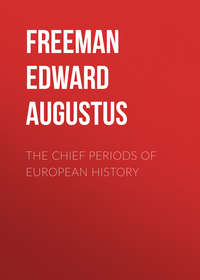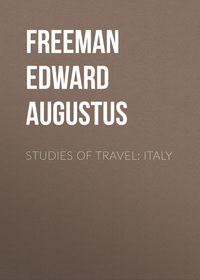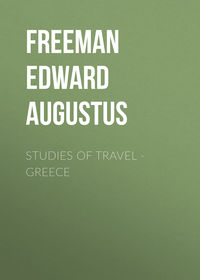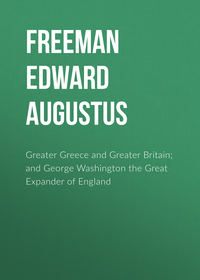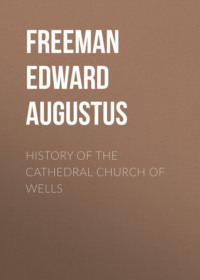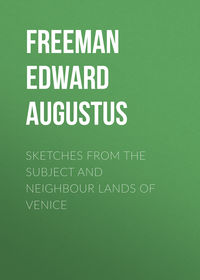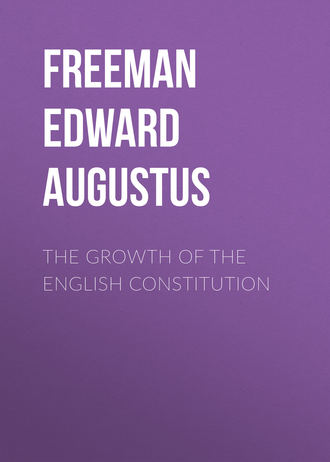 полная версия
полная версияThe Growth of the English Constitution
75
See the history of Stephen Martel in Sismondi, Histoire des Français, vol. vi. cap. viii. ix., and the account of the dominion of the Butchers, vii. 259, and more at large in Thierry’s History of the Tiers-État, capp. ii. iii.
76
The Parliament of Paris, though it had its use as some small check on the mere despotism of the Crown, can hardly come under the head of free institutions. France, as France, under the old state of things, cannot be said to have kept any free institutions at all; the only traces of freedom were to be found in the local Estates which still met in several of the provinces. See De Tocqueville, Ancien Régime, 347.
77
The thirteenth century was the time when most of the existing states and nations of Europe took something like their present form and constitution. The great powers which had hitherto, in name at least, divided the Christian and Mahometan world, the Eastern and Western Empires and the Eastern and Western Caliphates, may now be looked on as practically coming to an end. England, France, and Spain began to take something like their present shape, and to show the beginnings of the characteristic position and policy of each. The chief languages of Western Europe grew into something like their modern form. In short, the character of this age as a time of beginnings and endings might be traced out in detail through the most part of Europe and Asia.
78
Dr. Pauli does not scruple to give him this title in his admirable monograph, “Simon von Montfort Graf von Leicester, der Schöpfer des Hauses der Gemeinen.” The career of the Earl should be studied in this work, and in Mr. Blaauw’s “Barons’ War.”
79
“Numquam libertas gratior exstat
Quam sub rege pio.” – Claudian, ii. Cons. Stil. 114.
80
Macaulay, i. 15. “England owes her escape from such calamities to an event which her historians have generally represented as disastrous. Her interest was so directly opposed to the interest of her rulers that she had no hope but in their errors and misfortunes. The talents and even the virtues of her six first French Kings were a curse to her. The follies and vices of the seventh were her salvation… England, which, since the battle of Hastings, had been ruled generally by wise statesmen, always by brave soldiers, fell under the dominion of a trifler and a coward. From that moment her prospects brightened. John was driven from Normandy. The Norman nobles were compelled to make their election between the island and the continent. Shut up by the sea with the people whom they had hitherto oppressed and despised, they gradually came to regard England as their country, and the English as their countrymen. The two races so long hostile, soon found that they had common interests and common enemies. Both were alike aggrieved by the tyranny of a bad King. Both were alike indignant at the favour shown by the court to the natives of Poitou and Aquitaine. The great grandsons of those who had fought under William and the great grandsons of those who had fought under Harold began to draw near to each other in friendship; and the first pledge of their reconciliation was the Great Charter, won by their united exertions, and framed for their common benefit.”
81
I have tried to work out the gradual character of the transfer of lands and offices under William in various parts of the fourth volume of my History of the Norman Conquest; see especially p. 22, et seqq. The popular notion of a general scramble for everything gives a most false view of William’s whole character and position.
82
See Norman Conquest, i. 176.
83
This is distinctly asserted in the Dialogus de Scaccario (i. 10), under Henry the Second: “Jam cohabitantibus Anglicis et Normannis, et alterutrum uxores ducentibus vel nubentibus, sic permixtæ sunt nationes, ut vix discerni possit hodie, de liberis loquor, quis Anglicus quis Normannus sit genere; exceptis duntaxat ascriptitiis qui villani dicuntur, quibus non est liberum obstantibus dominis suis a sui statûs conditione discedere.”
84
The Angevin family are commonly known as the Plantagenets; but that name was never used as a surname till the fifteenth century. The name is sometimes convenient, but it is not a really correct description, like Tudor and Stewart, both of which were real surnames, borne by the two families before they came to the Crown. In the almanacks the Angevins are called “The Saxon line restored,” a name which gives a false idea, though there can be no doubt that Henry the Second was fully aware of the advantages to be drawn from his remote female descent from the Old-English Kings. The point to be borne in mind is that the accession of Henry is the beginning of a distinct dynasty which could not be called either Norman or English in any but the most indirect way.
85
I do not remember anything in any of the writers of Henry the Second’s time to justify the popular notions about “Normans and Saxons” as two distinct and hostile bodies. Nor do we as yet hear many complaints of favour being shown to absolute foreigners in preference to either, though it is certain that many high preferments, especially in the Church, were held by men who were not English in either sense. The peculiar position of Henry the Second was something like that of the Emperor Charles the Fifth, that of a prince ruling over a great number of distinct states without being nationally identified with any of them. Henry ruled over England, Normandy, and Aquitaine, but he was neither English, Norman, nor Gascon.
86
That is the greater, the continental, part of the Duchy. The insular part of Normandy, the Channel Islands, was not lost, and it still remains attached to the English Crown, not as part of the United Kingdom, but as a separate dependency. See Norman Conquest, i. 187.
87
See Norman Conquest, i. 310, 367; and on the appointment of Bishops and Abbots, i. 503, ii. 66, 571.
88
See the Ordinance in Norman Conquest, iv. 392. Stubbs, Select Charters, 81.
89
See Norman Conquest, iii. 317.
90
It should be remembered that the clerical immunities which were claimed in this age were by no means confined to those whom we should now call clergymen, but that they also took in that large class of persons who held smaller ecclesiastical offices without being what we should call in holy orders. The Church also claimed jurisdiction in the causes of widows and orphans, and in various cases where questions of perjury, breach of faith, and the like were concerned. Thus John Bishop of Poitiers writes to Archbishop Thomas (Giles, Sanctus Thomas, vi. 238) complaining that the King’s officers had forbidden him to hear the causes of widows and orphans, and also to hear causes in matters of usury: “prohibentes ne ad querelas viduarum vel orphanorum vel clericorum aliquem parochianorum meorum in causam trahere præsumerem super quacumque possessione immobili, donec ministeriales regis, vel dominorum ad quorum feudum res controversiæ pertineret, in facienda justitia eis defecissent. Deinde ne super accusatione fœnoris quemquam audirem.” This gives a special force to the acclamations with which Thomas was greeted on his return as “the father of the orphans and the judge of the widows:” “Videres mox pauperum turbam quæ convenerat in occursum, hos succinctos ut prævenirent et patrem suum applicantem exciperent, et benedictionem præriperent, alios vero humi se humiliter prosternentes, ejulantes hos, plorantes illos præ gaudio, et omnes conclamantes, Benedictus qui venit in nomine Domini, pater orphanorum et judex viduarum! et pauperes quidem sic.” Herbert of Bosham, Giles, Sanctus Thomas, vii. 315, cf. 148. See more in Historical Essays, 99.
91
On the cruel punishments inflicted in the King’s courts Herbert of Bosham is very emphatic in more than one passage. He pleads (vii. 101) as a merit of the Bishops’ courts that in them no mutilations were inflicted. Men were punished there “absque omni mutilatione vel deformatione membrorum.” But he by no means claims freedom from mutilation as a mere clerical privilege; he distinctly condemns it in any case. “Adeo etiam quod ordinis privilegium excludat cauterium: quam tamen pœnam communiter inter homines etiam jus forense damnat: ne videlicet in homine Dei imago deformetur.” (vii. 105.) A most curious story illustrative of the barbarous jurisprudence of the time will be found in Benedict’s Miracula Sancti Thomæ, 184.
92
One of the Constitutions of Clarendon forbade villains to be ordained without the consent of their lords. “Filii rusticorum non debent ordinari absque assensu domini de cujus terra nati dignoscuntur” (Stubbs, Select Charters, 134). On the principles of feudal law nothing can be said against this, as the lord had a property in his villain which he would lose by the villain’s ordination. The prohibition is noticed in some remarkable lines of the earliest biographer of Thomas, Garnier of Pont-Sainte-Maxence (La Vie de Saint Thomas le Martyr, Paris, 1859, p. 89), where he strongly asserts the equality of gentleman and villain before God: —
“Fils à vilains ne fust en nul liu ordenez
Sanz l’otrei sun seigneur de cui terre il fu nez.
Et deus à sun servise nus a tuz apelez!
Mielz valt filz à vilain qui est preux e senez,
Que ne feit gentilz hum failliz et debutez.”
Thomas himself was not the son of a villain, but his birth was such that the King could sneer at him as “plebeius quidam clericus.”
93
We are not inclined to find fault with such an appointment as that of Stephen Langton; still his forced election at the bidding of Innocent was a distinct breach of the rights of the King, of the Convent of Christ Church, and of the English nation generally. See the account of his election in Roger of Wendover, iii. 212; Lingard, ii. 314; Hook’s Archbishops, ii. 668.
94
See the Bulls and Letters by which Innocent professed to annul the Great Charter in Roger of Wendover, iii. 323, 327; the excommunication of the Barons in iii. 336; and the suspension of the Archbishop in iii. 340.
95
There is a separate treatise on the Miracles of Simon of Montfort, printed along with Rishanger’s Chronicle by the Camden Society, 1840.
96
I think I may safely say that the only royalist chronicler of the reign of Henry the Third is Thomas Wykes, the Austin Canon of Osney. There is also one poem on the royalist side, to balance many on the side of the Barons, among the Political Songs published by the Camden Society, 1839, page 128.
Letters to Earl Simon and his Countess Eleanor form a considerable part of the letters of Robert Grosseteste, published by Mr. Luard for the Master of the Rolls. Matthew Paris also (879, Wats) speaks of him as “episcopus Lincolniensis Robertus, cui comes tamquam patri confessori exstitit familiarissimus.” This however was in the earlier part of Simon’s career, before the war had broken out. The share of Bishop Walter of Cantilupe, who was present at Evesham and absolved the Earl and his followers, will be found in most of the Chronicles of the time. It comes out well in the riming Chronicle of Robert of Gloucester (ii. 558): —
“Þe bissop Water of Wurcetre asoiled hom alle pere
And prechede hom, þat hii adde of deþ þe lasse fere.”
This writer says of the battle of Evesham: —
“Suich was þe morþre of Eivesham (vor bataile non it was).”
97
This letter, addressed in 1247 to Pope Innocent the Fourth, will be found in Matthew Paris (721, Wats). It is written in the name of “universitas cleri et populi per provinciam Cantuariensem constituti,” and it ends, “quia communitas nostra sigillum non habet, præsentes literas signo communitatis civitatis Londinensis vestræ sanctitati mittimus consignatas.” Another letter in the same form follows to the Cardinals. There are two earlier letters in 1245 and 1246 (Matthew Paris, 666, 700), the former from the “magnates et universitas regni Angliæ,” the other in the name of Richard Earl of Cornwall (afterwards King of the Romans), Simon Earl of Leicester, and other Earls, “et alii totius regni Angliæ Barones, proceres, et magnates, et nobiles portuum maris habitatores, necnon et clerus et populus universus.” The distinct mention of the Cinque Ports, whose representatives in Parliament are still called Barons – the “nobiles” of the letter – should be noticed.
98
The writer of the Gesta Stephani(3) distinctly attributes the election of Stephen to the citizens of London: “Majores igitur natu, consultuque quique provectiores, concilium coegere, deque regni statu, pro arbitrio suo, utilia in commune providentes, ad regem eligendum unanimiter conspiravere.” He then goes on with the details of the election. He is borne out by the Chronicle 1135: “Stephne de Blais com to Lundene and te Lundenisce folc him underfeng;” and by William of Malmesbury, Historia Novella, i. 11: “A Londoniensibus et Wintoniensibus in Regem exceptus est.” So again when the Legate, Henry Bishop of Winchester, holds a council for the election of the Empress Matilda, the citizens of London were summoned, and it is distinctly said that they held the rank of nobles or barons: “Londonienses (qui sunt quasi optimates, pro magnitudine civitatis, in Anglia).” “Londonienses, qui præcipui habebantur in Anglia, sicut proceres” (Historia Novella, iii. 45, 46). All this is exactly like the earlier elections of Kings before the Conquest.
99
The words of the Charter 12-14 (Stubbs, 290) are: “Nullum scutagium vel auxilium ponatur in regno nostro, nisi per commune consilium regni nostri, nisi ad corpus nostrum redimendum, etc… Et ad habendum commune consilium regni, de auxilio assidendo aliter quam in tribus casibus prædictis, vel de scutagio assidendo, summoneri faciemus archiepiscopos, episcopos, abbates, comites, et majores barones, sigillatim per litteras nostras; et præterea faciemus summoneri in generali, per vicecomites et ballivos nostros, omnes illos qui de nobis tenent in capite.” This is exactly like the entry in the Chronicle [1123], describing the summoning of a Witenagemót by Henry the First: “Da sone Þæræfter sende se kyng hise write ofer eal Englalande, and bed hise biscopes and hise abbates and hise Þeignes ealle Þet hi scolden cumen to his gewitenemot on Candelmesse deig to Gleawceastre him togeanes; and hi swa diden.”
100
These first glimmerings of parliamentary representation were carefully traced out by Hallam (Middle Ages, ii. 146-152). They can now be more fully studied in the work of Professor Stubbs. On the summons in 1213 of four men for each shire besides “milites et barones” (“quatuor discretos homines de comitatu tuo illuc venire facias”), the Professor remarks [278]: “It is the first writ in which the ‘four discreet men’ of the county appear as representatives; the first instance of the summoning of the folkmoot to a general assembly by the machinery already used for judicial purposes.”
101
On this subject the eighth chapter of Sir Francis Palgrave’s English Commonwealth should be studied.
102
For the whole career of Simon I must again refer generally to Pauli and Blaauw. The great writ itself, dated at Worcester, December 14th, 1264, will be found in Rymer’s Fœdera, i. 449. It has often been noticed how small is the number of Earls and other lay Barons, and how unusually large the number of churchmen, who are summoned to this Parliament. The whole list will be found in Rymer. The parts of the writ which concern us stand thus:
“Item mandatum est singulis vicecomitibus per Angliam; quod venire faciant duos milites de legalioribus, probioribus et discretioribus militibus singulorum comitatuum, ad Regem London’ in octab’ prædictis, in formâ supradictâ.
“Item in formâ prædictâ scribitur civibus Ebor’, civibus Lincoln’, et cæteris burgis Angliæ; quod mittant in formâ prædictâ duos de discretioribus, legalioribus, et probioribus, tam civibus, quam burgensibus suis.
“Item in formâ prædictâ mandatum est baronibus, et probis hominibus Quinque Portuum.”
“This is often regarded as the origin of popular representation; but it is not in any sense entitled to that praise. The novelty was simply the assembling the representatives of the towns in conjunction with those of the counties; this was now done for the first time for the purpose of the national council.” Stubbs, 401.
103
The account of this most remarkable trial, held on June 11th, 1252, is given in a letter from Simon’s intimate friend the famous Franciscan Adam Marsh (de Marisco) to Bishop Robert Grosseteste. The Latin text is printed in Mr. Brewer’s Monumenta Franciscana, p. 122, and there is an English translation in the Appendix to Mrs. Green’s Life of Countess Eleanor, English Princesses, ii. 447. Simon’s witnesses, knights and citizens, come “muniti litteris patentibus communitatis Burdegalensis, in quâ quasi totum robur Vasconiæ ad distringendum hostiles et fideles protegendum consistere dignoscitur,” setting forth how good Simon’s government was in every way, and how those who brought charges against him did it only because his strict justice had put a check on their misdoings. We may compare the words of the great poetical manifesto (Political Songs, 76).
“Seductorem nominant S. atque fallacem,
Facta sed examinant probantque veracem.”
104
For the Londoners at Lewes let us take the account of an enemy. Thomas Wykes [148] tells us how the Earl set out, “glorians in virtute sua congregata baronum multitudine copiosa, Londoniensium innumerabili agmine circumcinctus, quia legitur stultorum infinitus est numerus.” Presently we read how the “Londoniensium innumera multitudo, bellorum ignara,” were put to flight by the Lord Edward very much after the manner of Prince Rupert.
105
On the religious reverence paid to Earl Waltheof, see Norman Conquest, ii. 602. I have there referred to the office of Thomas of Lancaster, which will be found in Political Songs, 268. Some of the pieces are what we should think most daring parodies of parts of the Church Service, but we may be sure that what was intended was reverence and not irreverence. There is another parody of the same kind in honour of Earl Thomas, a little earlier back in the volume, p. 258. It was a matter of course that Thomas of Lancaster should be likened to Thomas of Canterbury.
“Gaude, Thoma, ducum decus, lucerna Lancastriæ,
Qui per necem imitaris Thomam Cantuariæ;
Cujus caput conculcatur pacem ob ecclesiæ,
Atque tuum detruncatur causa pacis Angliæ.”
106
Let us take a Latin, a French, and an English specimen of the poems in which Simon’s death was lamented and his intercession implored.
“Salve, Symon Montis Fortis,
Totius flos militiæ,
Durus pœnas passus mortis,
Protector gentis Angliæ.
Sunt de sanctis inaudita
Cunctis passis in hac vita,
Quemquam passum talia;
Manus, pedes, amputari,
Caput, corpus, vulnerari,
Abscidi virilia.
Sis pro nobis intercessor
Apud Deum, qui defensor
In terris exstiteras.” – (Political Songs, 124.)
The French poem which follows directly in the collection is too long to copy in full. This is perhaps the most remarkable stanza, in which we again find the comparison with Thomas of Canterbury: —
“Mès par sa mort, le cuens Mountfort conquist la victorie,
Come ly martyr de Caunterbyr, finist sa vie;
Ne voleit pas li bon Thomas qe perist seinte Eglise,
Le cuens auxi se combati, e morust sauntz feyntise.
Ore est ocys la flur de pris, qe taunt savoit de guerre,
Ly quens Montfort, sa dure mort molt emplorra la terre.”
In this poem there is not, as in the Latin one, any direct prayer to the martyred Earl, but in the last stanza we read: —
“Sire Simoun ly prodhom, e sa compagnie,
En joie vont en ciel amount, en pardurable vie.”
The only English piece on these wars belongs to an earlier date, namely, the satirical poem against King Richard, how the one English Augustus but we get verses on Simon’s death in the Chronicle of Robert of Gloucester (ii. 559): —
“Makede him a castel of a mulne post;”
“& sir Simond was aslawe, & is folk al to grounde,
More murÞre are nas in so lute stounde.
Vor Þere was werst Simond de Mountfort aslawe, alas!
& sir Henri is sone, Þat so gentil knizt was.
******
& among alle oÞere mest reuÞe it was ido,
Þat sir Simon Þe olde man demembred was so.”
He then goes on with the details of the dismemberment, of which a picture may be seen opposite p. 254 of Mr. Blaauw’s book, and then goes on with the lines which I have before quoted: —
“Suich was Þe morÞre of Eivesham (vor bataile non it was),
And Þer wiÞ Jesu Crist wel vuele ipaied was,
As he ssewede bitokninge grisliche and gode,
As it vel of him sulue, Þo he deide on Þe rode,
Þat Þoru al Þe middelerd derk hede Þer was inou.”
107
On the occasional and irregular summoning of the borough members between 1265 and 1295 see Hallam, Middle Ages, ii. 160, 165, and more fully in Stubbs, Select Charters, 420, 427, where the gradual developement of parliamentary representation is treated as it has never been treated before, with a full citation of the authorities. The language in which the chroniclers speak of the constitution of the early Parliaments of Edward is as vague as that in which our ancient Gemóts are described. Sometimes they speak only of “proceres” and the like; sometimes they distinctly mention the popular element. Curiously enough, the official language is sometimes more popular than that of the annalists. Thus the Winchester Annals, recording the Statute of Westminster in 1273, call the Assembly which passed it a “communis convocatio omnium magnatum regni,” though it incidentally implies the presence of other persons, “quamplures de regno qui aliqua feoda de corona regia tenuerunt.” But the preamble of the Statute itself records the “assentement des erceveskes, eveskes, abbes, priurs, contes, barons, et la communaute de la tere ileokes somons.” So in the later Parliament of the same year the Annals speak only of the “communis consensus archiepiscoporum, comitum, et baronum,” while the official description is “prælati, comites, barones, et alii de regno nostro.” But in an earlier Assembly, that held in 1273, before Edward had come back to England, the same Winchester Annals tell us how “convenerunt archiepiscopi et episcopi, comites et barones, et de quolibet comitatu quatuor milites et de qualibet civitate quatuor.” This and the summons to the Parliament of 1285, which sat in judgement on David of Wales (Stubbs, 453, 457), seem the most distinct cases of borough representation earlier than 1295, since which time the summoning of the borough members has gone on regularly. See Stubbs, 473. Mr. Stubbs’ remarks on the Assemblies of “the transitionary period” in pp. 465, 469 should be specially studied.
108
The history of the resistance of these two Earls to King Edward, which led to the great Confirmation of the Charters in 1297, will be found in all the histories of the time, old and new. See also Stubbs, 431, 479. I feel no difficulty in reconciling respect for Edward with respect for the men who withstood him. The case is well put by Stubbs, 34, 35.
109
The exact value of the document commonly known as the statute “De Tallagio non concedendo” is discussed by Professor Stubbs, p. 487. It is perhaps safest to look on it, like many of the earlier collections of laws, not indeed as an actual statute, but as good evidence of a principle which, from the time of the Confirmation of the Charters, has been universally received. The words are —


